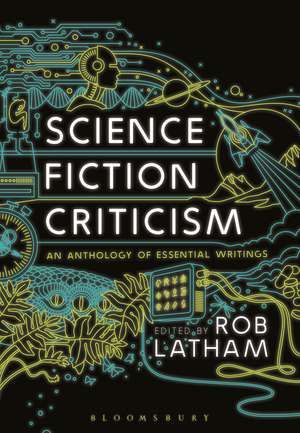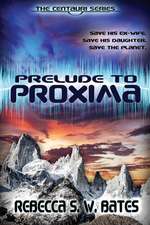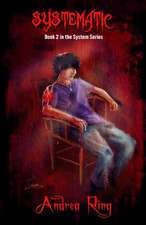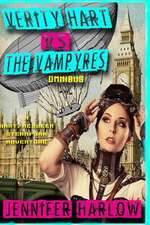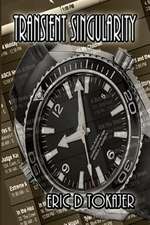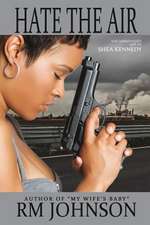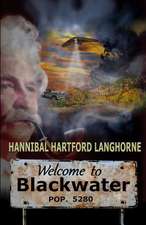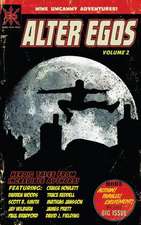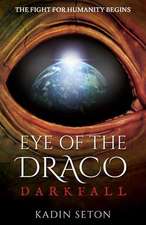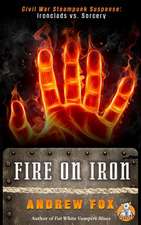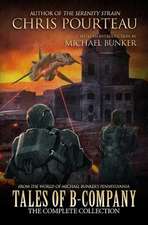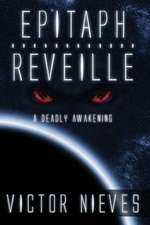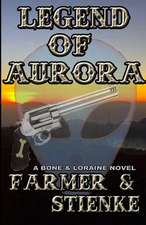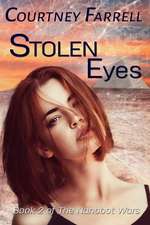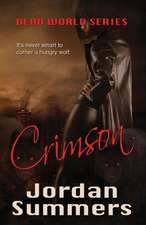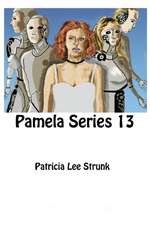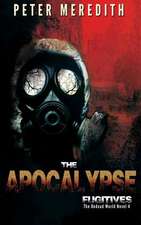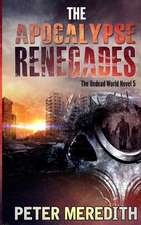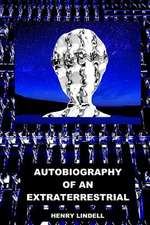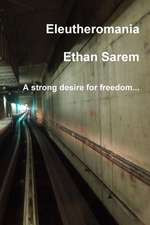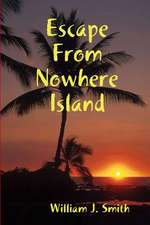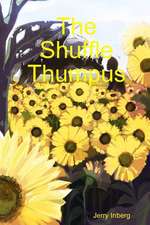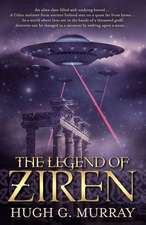Science Fiction Criticism: An Anthology of Essential Writings
Autor Professor Rob Lathamen Limba Engleză Paperback – 22 feb 2017
| Toate formatele și edițiile | Preț | Express |
|---|---|---|
| Paperback (1) | 267.00 lei 6-8 săpt. | +96.39 lei 7-11 zile |
| Bloomsbury Publishing – 22 feb 2017 | 267.00 lei 6-8 săpt. | +96.39 lei 7-11 zile |
| Hardback (1) | 843.27 lei 6-8 săpt. | |
| Bloomsbury Publishing – 22 feb 2017 | 843.27 lei 6-8 săpt. |
Preț: 267.00 lei
Preț vechi: 313.66 lei
-15% Nou
Puncte Express: 401
Preț estimativ în valută:
51.10€ • 55.48$ • 42.92£
51.10€ • 55.48$ • 42.92£
Carte tipărită la comandă
Livrare economică 22 aprilie-06 mai
Livrare express 18-22 martie pentru 106.38 lei
Preluare comenzi: 021 569.72.76
Specificații
ISBN-13: 9781474248617
ISBN-10: 1474248616
Pagini: 592
Ilustrații: 13 b/w illustrations
Dimensiuni: 169 x 244 x 30 mm
Greutate: 1.16 kg
Editura: Bloomsbury Publishing
Colecția Bloomsbury Academic
Locul publicării:London, United Kingdom
ISBN-10: 1474248616
Pagini: 592
Ilustrații: 13 b/w illustrations
Dimensiuni: 169 x 244 x 30 mm
Greutate: 1.16 kg
Editura: Bloomsbury Publishing
Colecția Bloomsbury Academic
Locul publicării:London, United Kingdom
Caracteristici
Includes writers and critics such as J.G. Ballard, Philip K. Dick, N. Katherine Hayles, Donna Haraway, Fredric Jameson, Joanna Russ, Susan Sontag and Darko Suvin
Notă biografică
Rob Latham is an independent scholar based in the USA. Winner of the Science Fiction Research Association's Thomas D. Clareson award for distinguished service to the field, he is editor of the journal Science Fiction Studies and of The Oxford Handbook of Science Fiction (2014), co-editor of The Wesleyan Anthology of Science Fiction (2010) and author of Consuming Youth: Vampires, Cyborgs and the Culture of Consumption (2002). For two decades, he was a senior editor of the journal Science Fiction Studies.
Cuprins
IntroductionPart I: Definition and Boundaries1. Editorial: A New Sort of Magazine, Hugo Gernsback2. Preface to The Scientific Romances of H.G. Wells, H.G. Wells 3. On the Writing of Speculative Fiction, Robert A. Heinlein4. What Do You Mean: Science? Fiction? Judith Merril5. Preface to Mirrorshades: The Cyberpunk Anthology, Bruce Sterling6. Cybernetic Deconstructions: Cyberpunk and Postmodernism, Veronica Hollinger7. The Many Deaths of Science Fiction: A Polemic, Roger Luckhurst8. On Defining SF, or Not: Genre Theory, SF, and History, John Rieder Recommended Further ReadingPart II: Structure and Form9. Which Way to Inner Space? J.G. Ballard10. About 5,750 Words, Samuel R. Delany11. On the Poetics of the Science Fiction Genre, Darko Suvin 12. The Absent Paradigm: An Introduction to the Semiotics of Science Fiction, Marc Angenot13. Reading SF as a Mega-Text, Damien Broderick14. Time Travel and the Mechanics of Narrative, David Wittenberg Recommended Further ReadingPart III: Ideology and World View15. Mutation or Death! John B. Michel16. The Imagination of Disaster, Susan Sontag17. The Image of Women in Science Fiction, Joanna Russ18. Progress versus Utopia; or, Can We Imagine the Future? Fredric Jameson 19. Science Fiction and Critical Theory, Carl Freedman 20. Alien Cryptographies: The View from Queer, Wendy Pearson21. The Women History Doesn't See: Recovering Mid-Century Women's SF as a Literature of Social Critique, Lisa YaszekRecommended Further ReadingPart IV: The Non-Human22. Author's Introduction to Frankenstein, Mary Shelley23. The Android and the Human, Philip K. Dick 24. A Cyborg Manifesto: Science, Technology, and Socialist Feminism in the Late Twentieth Century, Donna Haraway25. Virtual Bodies and Flickering Signifiers, N. Katherine Hayles26. The Coming Technological Singularity: How to Survive in a Post-Human Era, Vernor Vinge 27. Aliens in the Fourth Dimension, Gwyneth Jones 28. Technofetishism and the Uncanny Desires of A.S.F.R. (alt.sex.fetish.robots), Allison de Fren29. Animal Alterity: Science Fiction and Human-Animal Studies, Sherryl Vint Recommended Further ReadingPart V: Race and the Legacy of Colonialism30. Science Fiction and Empire, Istvan Csicsery-Ronay31. Further Considerations on Afrofuturism, Kodwo Eshun 32. Indigenous Scientific Literacies in Nalo Hopkinson's Ceremonial Worlds, Grace Dillon33. Biotic Invasions: Ecological Imperialism in New Wave Science Fiction, Rob Latham34. Alien/Asian: Imaging the Racialized Future, Stephen Hong Sohn35. A Report from Planet Midnight, Nalo Hopkinson36. Future Histories and Cyborg Labor: Reading Borderlands Science Fiction after NAFTA, Lysa Rivera Recommended Further ReadingIndex
Recenzii
Ultimately, by covering many bases without being laborious, Latham's Science Fiction Criticism manages to offer a high use-value for students of science fiction while also appealing to non-academic fans.
Science Fiction Criticism: An Anthology of Essential Writings is an excellent collection for use in teaching or as a reference volume, especially for newer scholars who may not have access to or knowledge of some of the older pieces collected here. Above all it emphasizes the diversity of the scholarship (and of original texts) beyond what too many consider to be 'just science fiction.' I predict it will be among the most useful collections for many years.
The editor of this seminal anthology will be familiar to SF critics. Rob Latham has been at the helm of two extremely important books, The Oxford Handbook of Science Fiction and The Wesleyan Anthology of Science Fiction, and for years he has served in an editorial capacity at Journal of the Fantastic in the Arts and most notably Science Fiction Studies, earning the Thomas D. Clareson award in 2013 for outstanding service in the field. It is fitting for him now to be the editor of Science Fiction Criticism, a crown jewel in his scholarship to date that should resonate with all students and academics who are new to SF or involved in the study and teaching of it.
A comprehensive and scholarly exploration of sf's history as a genre of socio-political opposition.
A very welcome addition to the bookshelves of scholars and students alike who will find it extraordinarily helpful to have such a range of critical interventions in one volume.
This collection is a stunning mixture of the familiar and the new: a combination of what's absolutely essential for anyone embarking on research in the Science Fiction field, and pieces that almost certainly will become essential in years to come. In fact, I would wager that Latham's collection itself will become essential reading and the go-to textbook for most if not all undergraduate courses in Science Fiction in the very near future ... For those of us on the staff side of the academic divide, the collection provides access to essays that may have been on our 'to-read' list for a long time, articles we have heard about but never unearthed, and introductions to areas beyond our specific sub-disciplines. This is an impressive feat of scholarship and critical historiography and an absolute boon to the field for teachers and students alike - and it's affordable to boot (well done, Bloomsbury). I recommend it unreservedly.
A truly excellent and innovative selection of essays that ranges from classics to essays that should and will become classics.
Rob Latham's sagely curated Science Fiction Criticism comes as close as we can hope for to a manageable archive of indispensable works of science fiction criticism. The compelling selections are consistently in conversation with one another, revealing the dialectical process through which the critical understanding of science fiction has matured.
For both beginning and experienced researchers, this volume is a finely balanced overview of science fiction's critical conversations-and should become a fixture on every serious critic's bookshelf. For those teaching science fiction, it is indispensable
In five useful sections, essays by science fiction authors, critics and theorists followed by well-chosen further reading lists, provide an invaluable resource for students interested in science fiction and its wider contexts.
As a teaching resource, its usefulness is undeniable.
One of the most valuable things about this anthology is that it demonstrates, time and again, how wide our universe of discourse has to be ... and how whatever story we tell about sf can never be the whole story. It is an invaluable anthology because, at last, we have a number of classic texts, from Gernsback's original editorial to Shelley's introduction, together in one place. It is an invaluable anthology because it gathers together a range of key essays, by some of the most important voices in the field. It is a book, in short, that deserves a place on your shelves.
Science Fiction Criticism: An Anthology of Essential Writings is an excellent collection for use in teaching or as a reference volume, especially for newer scholars who may not have access to or knowledge of some of the older pieces collected here. Above all it emphasizes the diversity of the scholarship (and of original texts) beyond what too many consider to be 'just science fiction.' I predict it will be among the most useful collections for many years.
The editor of this seminal anthology will be familiar to SF critics. Rob Latham has been at the helm of two extremely important books, The Oxford Handbook of Science Fiction and The Wesleyan Anthology of Science Fiction, and for years he has served in an editorial capacity at Journal of the Fantastic in the Arts and most notably Science Fiction Studies, earning the Thomas D. Clareson award in 2013 for outstanding service in the field. It is fitting for him now to be the editor of Science Fiction Criticism, a crown jewel in his scholarship to date that should resonate with all students and academics who are new to SF or involved in the study and teaching of it.
A comprehensive and scholarly exploration of sf's history as a genre of socio-political opposition.
A very welcome addition to the bookshelves of scholars and students alike who will find it extraordinarily helpful to have such a range of critical interventions in one volume.
This collection is a stunning mixture of the familiar and the new: a combination of what's absolutely essential for anyone embarking on research in the Science Fiction field, and pieces that almost certainly will become essential in years to come. In fact, I would wager that Latham's collection itself will become essential reading and the go-to textbook for most if not all undergraduate courses in Science Fiction in the very near future ... For those of us on the staff side of the academic divide, the collection provides access to essays that may have been on our 'to-read' list for a long time, articles we have heard about but never unearthed, and introductions to areas beyond our specific sub-disciplines. This is an impressive feat of scholarship and critical historiography and an absolute boon to the field for teachers and students alike - and it's affordable to boot (well done, Bloomsbury). I recommend it unreservedly.
A truly excellent and innovative selection of essays that ranges from classics to essays that should and will become classics.
Rob Latham's sagely curated Science Fiction Criticism comes as close as we can hope for to a manageable archive of indispensable works of science fiction criticism. The compelling selections are consistently in conversation with one another, revealing the dialectical process through which the critical understanding of science fiction has matured.
For both beginning and experienced researchers, this volume is a finely balanced overview of science fiction's critical conversations-and should become a fixture on every serious critic's bookshelf. For those teaching science fiction, it is indispensable
In five useful sections, essays by science fiction authors, critics and theorists followed by well-chosen further reading lists, provide an invaluable resource for students interested in science fiction and its wider contexts.
As a teaching resource, its usefulness is undeniable.
One of the most valuable things about this anthology is that it demonstrates, time and again, how wide our universe of discourse has to be ... and how whatever story we tell about sf can never be the whole story. It is an invaluable anthology because, at last, we have a number of classic texts, from Gernsback's original editorial to Shelley's introduction, together in one place. It is an invaluable anthology because it gathers together a range of key essays, by some of the most important voices in the field. It is a book, in short, that deserves a place on your shelves.
